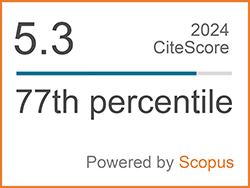Fish Protein Hydrolysate Production by Acid and Enzymatic Hydrolysis
Abstract
The objective of this study was to optimize the condition for fish protein hydrolysate production from minced by-catch fish by using hydrochloric acid and 2 protease enzymes; Papain and Alcalase. Taguchi design and Central Composite Design (CCD) were applied for experimental design to evaluate the degree of hydrolysis. Response surface methodology was performed in order to determine the optimal production conditions. The optimal condition for acid hydrolysis was 4 mol/L of hydrochloric acid at 100oC for 90 minutes which yielded 50.70% degree of hydrolysis. For enzymatic hydrolysis, Alcalase is the most suitable protease enzyme for fish protein hydrolysate production. The optimal condition was 6 % (w/w) Alcalase concentration at the temperature of 61.23 oC and the reaction time of 27.36 minutes resulting in 88.9% of degree of hydrolysis. Amino acid profiles of fish protein hydrolysates hydrolyzed under the optimal condition were analyzed by HPLC and the results showed that fish protein hydrolyzed by Papain had highest nutritional properties. Glutamic acid had the highest percentage (16.35%) followed by Aspartic acid (10.41%) and Lysine (8.48%).
Keywords
DOI: 10.14416/j.ijast.2016.11.004
Refbacks
- There are currently no refbacks.
 Applied Science and Engineering Progress
Applied Science and Engineering Progress







